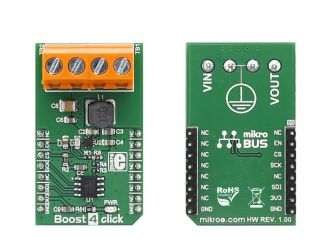
We strongly encourage users to use Package manager for sharing their code on Libstock website, because it boosts your efficiency and leaves the end user with no room for error. [more info]

Rating:
Author: MIKROE
Last Updated: 2019-01-10
Package Version: 1.0.0.1
mikroSDK Library: 1.0.0.0
Category: Boost
Downloaded: 6017 times
Not followed.
License: MIT license
Boost 4 click carries the TPS61230A, a high efficiency fully integrated synchronous boost converter from Texas Instruments. The click is designed to run on a 3.3V power supply. It communicates with the target microcontroller over SPI interface.
Do you want to subscribe in order to receive notifications regarding "Boost 4 click" changes.
Do you want to unsubscribe in order to stop receiving notifications regarding "Boost 4 click" changes.
Do you want to report abuse regarding "Boost 4 click".

Library Description
The library covers all the necessary functions to control Boost 4 Click board.
Boost 4 click communicates with the target board via SPI protocol.
This library contains drivers for enable the device regulator, forces the device into shutdown mode,
for sets output voltage and for sets min and max output voltage.
Key functions:
void boost4_enable() - Enable the device regulator function.void boost4_setOutVoltage( uint16_t value ) - Set output voltage function.void boost4_setOutVoltageMax() - Set the maximum output voltage function.Examples description
The application is composed of the three sections :
void applicationTask()
{
mikrobus_logWrite( " Set the max Vout ~ 5.25 V ", _LOG_LINE );
boost4_setOutVoltageMax();
Delay_ms( 5000 );
mikrobus_logWrite( "-----------------------------", _LOG_LINE );
mikrobus_logWrite( " Set the min Vout ~ 3.05 V ", _LOG_LINE );
boost4_setOutVoltageMin();
Delay_ms( 5000 );
mikrobus_logWrite( "-----------------------------", _LOG_LINE );
}
Other mikroE Libraries used in the example:
SPIUARTAdditional notes and information
Depending on the development board you are using, you may need USB UART click, USB UART 2 click or RS232 click to connect to your PC, for development systems with no UART to USB interface available on the board. The terminal available in all MikroElektronika compilers, or any other terminal application of your choice, can be used to read the message.